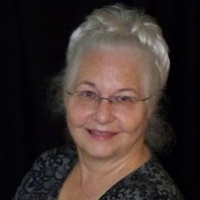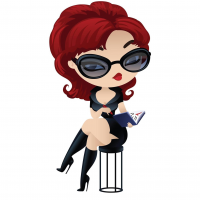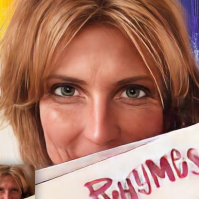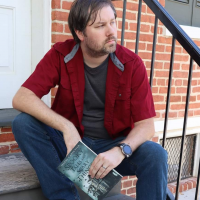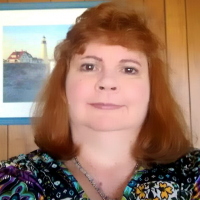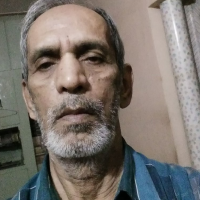#1 STAY FOCUSED
There's always, always something that can distract you from sitting in your writing chair. The grandkids want you to go play in the snow. The doughnut in the kitchen is calling your name. It takes a lot of self discipline to get a book written. You are your own boss, so you have to keep reminding yourself that if you don't get a book written, you are not going to get it published.
#2 NOTEBOOK, FILE, SOMETHING
Keep a notebook, file or something to refer back to concerning your characters. If Tommy has brown eyes on page four, blue eyes on page sixty and brown eyes on page two hundred, your readers will scream at you. I'm old school. I still use a notebook and a pen for my rough outline ideas. On the first page of that notebook I write the ABC's down one side, and then I start a list of my characters. You really shouldn't have characters with the same first initial. It's confusing to your reader. Also hero/heroine with sound alike names (Lisa and Lane) will stump your reader. Especially on series books when I need to remember the hero from book one when I'm writing book seven, I buy one of those little recipe card files and keep it right beside my computer. Each character, even the dogs and cats, gets an index card (filed alphabetically by first name) in the card box. That way all I have to do is find the card, and presto hero in number one was six feet two inches tall and had blue eyes. Some folks like to do this on the computer, and that's fine, but once I lost nine thousand words by shutting the wrong window and not saving. So it's old school for me.
#3 EDIT! EDIT! EDIT!
Your rough draft is finished. Now it's time to edit, edit, edit. Have someone else read your manuscript, and don't take the constructive criticism personal.
#4 WALK AWAY
If you begin to feel overwhelmed while you're working on those edits, get up and walk away from them. That's when it's all right to leave the writing chair. Take a walk. Pet the cat. Get your mind cleared so you can go back to the edits with a fresh outlook.
#5 START A NEW BOOK
Your book is finished, is in the agent's hands or the publisher's, now what? You start another book! This is the WRITE, DON'T WHINE! phase. Don't whine that it's taking so long to get your book published, or that you've got rejection slips. Write another book while you're waiting. When that first one does sell, you'll have a new one in your hands to sell.
-
-
- View all 10 comment
First, make sure you're writing to share something in a means to connect with the audience your piece is intended for. Second, even if you only start out this way, use an easy, conversational voice. This allows the ideas, the plot and pieces of your writing to fall into place readily. You can always go back to edit it in parts to give it formality if that's what is needed. My third tip is to step away from your writing table and allow ideas to brew in your head. You don't always need to work it out on paper (or typed straight into the computer). You're giving yourself lots of room and freedom for the best storyline, word use, etc. Fourth tip is to be super selective of your words. Every word counts, no matter the length of your writing project. I know it takes time and patience, but make sure every word you choose is the perfect one in its spot. Finally, and I know you may have heard this over and over again, but edit-edit-edit. Re-read and re-write and re-think until it shines as bright as the sun. You and your writing are worth it.
#TopTip - Read in the genre you want to write in and read a lot of it! If you don’t know what readers want, you won’t be able to write what they want.
1. You can always learn something.
2. Never stop. Even if the situation seems to call for stopping. Breaks are ok though.
3. Get out and see the world. Sometimes watching human interaction or the day to day hustle of life can inspire conversation, situation, or settings!
4. Write for you first, write for "them" second. Put what you want to put on paper first, and revise for others to enjoy!
5: Don't write for page count or word count. Write to tell the story, whether that takes 20,000 words, or 140,000. Tell the story.
Just write. You learn by doing. Crafting sentences and scenes and characters and worlds becomes easier the more you do it.
Understand the type of fiction writer you are. If you are not that fond of planning ahead, that's OK. If you need to plot every little thing in every chapter, that's OK. If you're in between, that's OK. If you are comfortable with how you write, it will be easier to do so.
Use timeline software. I write my stories, then go back and add everything to a timeline as part of my editing process. I've caught mistakes in dates doing this and can fix them before they become a problem.
If you're stuck writing, answer a prompt question. These questions can be serious or silly or informative. Prompts like, "Where's the coolest coffee house in your setting," or "What does the color blue mean to your cultures" or "What's the most terrifying carnival ride at the nearby theme park" may never make it into your story, but focusing on them can get you thinking about your tale, your characters, your world, in a different way--and perhaps break through that writing block.
Write down all names and places and a brief description of them. There's nothing so frustrating as trying to remember the name of a bit character that suddenly became more important, searching through the chapters trying to remember where you mentioned them, realizing where you thought you wrote them is not so, and re-reading half your book to rediscover them.
1. Write everyday, even a poem if you have nothing to write about.
2. Meditate more.
3. Stay away from Tv and music in the process.
4. Connect with fellow writers.
5. Do not despise readers opinions, and talk about your writing.
1. Write a book that makes the reader feel like their eavesdropping on a conversation.
2. Write a book the makes the reader relate your story to their story.
3. Write sentences that vary in length and in structure and sound like speech.
4. Break from the story to describe the movements of the passing world. This will build tension.
5. Keep your writing personal in tone and universal in scope.
1. Write what you love
2. If you're able - write the genre which is popular - this method is not always certain.
3. Home work. Research your characters - their careers, their medical history, even their clothing and cars. - Readers pick up on what is fact and what is fiction when it comes to certain topics.
4. If you think you are finished your manuscript, put it aside for a couple of weeks then go back over it. You will pick up mistakes, typos and rewrite paragraphs. Or change chapters. Look at it with fresh eyes.
5. Bad reviews are wasted words. Most of the bad one-or-two-star reviews are trolls copying and pasting a standard scripted paragraph to make you look bad. Did they even buy your book or read it? Never take a bad review to heart. If it is a real review - what are the positives to it? Or maybe use it to your advantage in your social media posts. Turn it around and make a negative to a positive and create new sales
Love and appreciate those wonderful friends who buy your first book & leave a review, and share the book info, and ask others to leave a review & respond to other reviews... whew... the best part: start planning your launch party to thank those people. It makes the countless hours we spend in front of a computer or falling asleep with a pen in our hand - worthwhile.
Write about places close to your heart and subjects you are passionate about.
Don't try to create perfect characters- create believable characters. Everyone has flaws/bad habits.
Write, write write ....the more you write, the better your writing becomes.
Don't be afraid to experiment with different genres
Start a blog - they're a great proving ground for new ideas
1. Write a book about something you enjoy doing.
2. Be honest and sincere in your book.
3. Keep it simple for all audiences.
4. Use illustrations, where possible.
5. Have a great cover that helps tell the story, and gets people to want to read the book.
Write it badly first—a horrible first draft makes it so much easier to 'revision' it into a wonderful story—in whatever form.
1. Research is essential, but experience is the only thing that can yield authenticity.
2. Imagine situation and scenes, jot them down in a notebook.
3. Whatever you cut, keep -- in an organized way -- for use in other stories.
4. Elicit emotion by showing action, character reactions & other effects; rarely by telling.
5. Every action and scene must move the story forward; even intentional red herrings (as with crime or mysteries) are needful but MUST have have purpose beyond being merely interesting.
